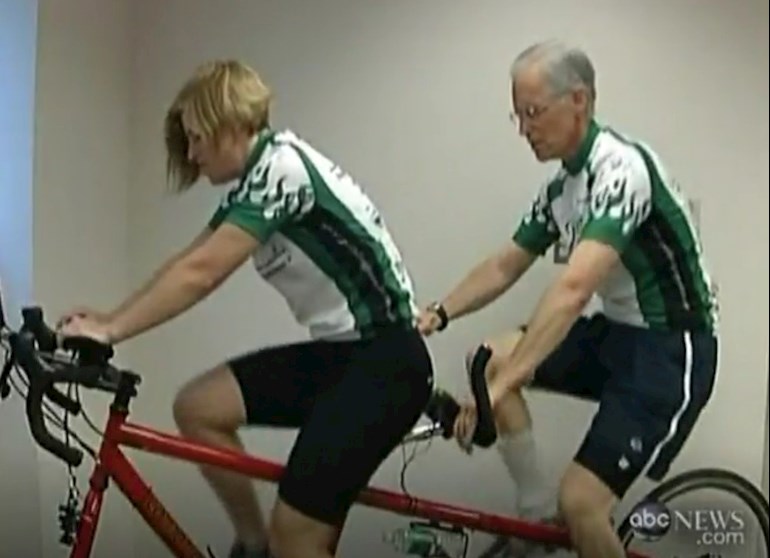VIDEO HERE:
Pedalling helps with Parkinson's! A 2-min... - Cure Parkinson's
Pedalling helps with Parkinson's! A 2-minute video that will really motivate you to exercise. :-)

Our own NanCyclist was the friend of Dr. Jay Alberts. 😊
This week I sent 124 Licensing Certificates to YMCAs and other health facilities that have Pedaling for Parkinson’s programs. I estimate there are several thousand people with Parkinson’s who are benefitting from the PFP program. After 11 years of PD, in many ways I’m stronger than when I started on this path. If you want information on starting a program or cycling on your own, please contact me. nan.little@comcast.net
A very interesting study done some years ago. I would highly recommend reading it carefully to understand what exactly the study concluded. While I personally feel "forced high RPM pedaling" is very beneficial, I also feel some other variables are at work simultaneously. Unfortunately, transferring the metrics to an individual "spinning" would require a high level of fitness which relatively few elderly PD patients probably have.
Thanks for this perspective.
Does anybody have a reference or any information about this study so I can find the article?
Here is the abstract of the original research paper:
ncbi.nlm.nih.gov/pubmed/191...
Here is a recent paper from one of the authors of the original paper:
See Jeff's response. It wasn't an article; it was a "case" study. Somewhat irrelevant for older PD patients, but nevertheless interesting. I would assume less than 1% of the elderly (>70) PD population could meet the three (3) basic criteria unless in a "forced" cycling environment which is rare. Even then, highly doubtful. Therefore, under normal circumstances, a "spin" bike is the only relevant alternative and you would need a comprehensive output monitor to determine compliance with the three (3) main criteria.
In sum, workable in a lab; in the real world, highly doubtful.
There is also some useful information in the comments section of this post from about 3 months ago:
healthunlocked.com/parkinso...
Jefff - I believe you analysis of the SPARX trial is incorrect. You may want to re-check what you stated in the other thread. The high intensity group was the most beneficial, not the other way around. Other than that, the SPARX trail results leave me dumbfounded. Did the research team measure the length of time within the heart rate boundaries? Doesn't seem like they did. 45-60 minutes within your max HR for a 70 year old is far different than 5 minutes.
In contrast, the forced high rpm case study required a 40 minute duration at a high intensity HR which means the subjects could (and would) never achieve the HR or wattage ouput on their own. So is SPARX a fantasy study? You tell me.
sharoncrayn said: "The high intensity group was the most beneficial, not the other way around."
jeffreyn said: "After six months researchers found that the motor symptoms of only the high-intensity group had not progressed."
I don't see a difference in meaning!
Regarding your other comments on the SPARX trial, I'll have to re-read part of it to remind myself!
Okay, I'm back. Three quick points to make.
(1) "progressed" means "got worse" (i.e. disease has progressed)
(2) The SPARX article says: "... 5 to 10 minutes of warm-up, 30 minutes of treadmill exercise at the target heart rate, and 5 to 10 minutes of cool down."
(3) On a tandem bike the 2 crankshafts are "locked" together by the chain. The stoker can be pedaling at 90 RPM but still not be making much effort, because the captain is forcing the stoker's crankshaft to go at that rate.
Unfortunately due to two knee replacements which I was getting over when I noticed the symptoms of PD. I am mostly suffering from balance and freezing problems and am not always able to go for a long walk. I miss badminton and other sports.